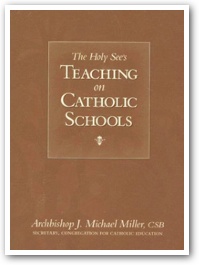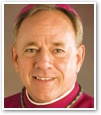Shared Responsibilities
- ARCHBISHOP J. MICHAEL MILLER, C.S.B
The Church's clear teaching, constantly reiterated by the Holy See, affirms that parents are the first educators of their children.
 |
Shared Responsibilities
Parental Rights and Subsidiarity
Parents have the original, primary, and inalienable right to educate their offspring in conformity with the family's moral and religious convictions. They are educators because they are parents. At the same time, the vast majority of parents share their educational responsibilities with other individuals and institutions, primarily the school.
Elementary education is, then, "an extension of parental education; it is extended and cooperative home schooling." In a true sense schools are extensions of the home. Parents -- and not schools either of the state or the Church -- have the primary moral responsibility of educating children to adulthood. Like a good Mother, the Church offers help to families by establishing Catholic schools that ensure the integral formation of their children.
In keeping with a basic tenet of Catholic social doctrine, the principle of subsidiarity must always govern relations among families, the Church, and the state. As Pope John Paul II wrote in his 1994 Letter to Families:
Subsidiarity thus complements paternal and maternal love and confirms its fundamental nature, inasmuch as all other participants in the process of education are only able to carry out their responsibilities in the name of the parents, with their consent, and, to a certain degree, with their authorization.
For subsidiarity to be effective, families must enjoy true liberty in deciding how their children are to be educated. This means that "in principle, a state monopoly of education is not permissible, and that only a pluralism of school systems will respect the fundamental right and the freedom of individuals -- although the exercise of this right may be conditioned by a multiplicity of factors, according to the social realities of each country." Thus, the Catholic Church upholds "the principle of a plurality of school systems in order to safeguard her objectives."
Right to Government Financial Assistance
A pressing problem for Catholic schools in the United States is the lack of government financial assistance. The Church's teaching authority has frequently addressed the rights of parents to such help in fulfilling their obligation to educate their children. At Vatican II, the Fathers declared that "the public power, which has the obligation to protect and defend the rights of citizens, must see to it, in its concern for distributive justice, that public subsidies are paid out in such a way that parents are truly free to choose according to their conscience the schools they want for their children."
The Compendium of the Social Doctrine of the Church (2005) states laconically that "the refusal to provide public economic support to non-public schools that need assistance and that render a service to civil society is to be considered an injustice." Furthermore, the state is obliged to provide such public subsidies because of the enormous contribution that Catholic schools make to society by serving the common good.
Most countries with substantial Christian majorities accept this obligation in justice: Australia, Belgium, Canada, England, France, Germany, Ireland, the Netherlands, Spain, and Scotland, to name a few. Their governments give Catholic schools financial assistance, some up to 100 percent. Italy, Mexico, China, Cuba, North Korea, and the United States are exceptions in withholding assistance.
For many families, especially those in the working and middle classes, the financial burden of providing Catholic education for their children is sizeable and often too great. Since 1990, the average tuition in elementary and secondary Catholic schools has more than doubled. In 2004, it stood at $2,432 for elementary schools and $5,870 for secondary schools.
As the American bishops recently stated, there is no other way to address this question of cost than "to advocate for parental school choice and personal and corporate tax credits." To advocate for some kind of government funding for Catholic education, as long as no unacceptable strings are attached, is the responsibility not just of parents of school-age children, but of all Catholics in their pursuit of justice. Too often Catholic Americans fail to appreciate that they have a right to subsidies for their schools because these institutions provide a service to society. In no way would such assistance compromise the constitutional separation of Church and state. Rather, it guarantees the fundamental right of parents to choose a school for their children.
Where the government bears its fair share of the financial burden, Catholic schools can flourish. Take the example of Melbourne, Australia. Melbourne is about the size of Houston; both cities have about four million inhabitants and more than one million Catholics. To serve its Catholic children, Melbourne has 256 elementary schools in its archdiocese and sixty-five secondary schools, compared with the Houston Archdiocese's fifty-two elementary and nine high schools. Why the difference? No doubt the answer lies in the generous public funding made available to Melbourne's Catholic schools.
Without some kind of government assistance or at least tax relief, it is difficult to see how Catholic education can remain affordable and accessible, especially to the increasing numbers of immigrant children, primarily Hispanics. Within less than a generation, Hispanics will constitute more than 50 percent of American Catholics and an even higher proportion of our Catholic children.
All Catholic children, not just those whose families have the financial means, have a right to a Catholic education. Vatican documents stress that the Church's preferential option for the poor means that she offers her educational ministry in the first place to "those who are poor in the goods of this world." The Holy See supports the concern of the American bishops to provide for the poor and those who might be underprepared for high academic achievement: the Catholic school "is a school for all, with special attention to those who are weakest." Guaranteeing this "for all" will require a new politics of educational funding in the United States.
|
The Holy See's Teaching on Catholic Schools ch. 1 - The Current Situation of America's Catholic Schools |
|
|
An Anthology of Catholic Teaching on Education
Leonard Franchi, Ed. |
 This is Meaghen Gonzalez, Editor of CERC. I hope you appreciated this piece. We curate these articles especially for believers like you.
This is Meaghen Gonzalez, Editor of CERC. I hope you appreciated this piece. We curate these articles especially for believers like you.
Please show your appreciation by making a $3 donation. CERC is entirely reader supported.

Acknowledgement
 The Most Reverend J. Michael Miller, CSB, "Shared Responsibilities." chap. 2 in The Holy See's Teaching on Catholic Schools (Atlanta: Sophia Institute Press, 2006): 9-15.
The Most Reverend J. Michael Miller, CSB, "Shared Responsibilities." chap. 2 in The Holy See's Teaching on Catholic Schools (Atlanta: Sophia Institute Press, 2006): 9-15.
Reprinted with permission of Sophia Press and the author, The Most Reverend Michael Miller, CSB Archbishop of Vancouver, B.C.
The Author

 The Most Reverend J. Michael Miller, CSB, was born in Ottawa, Canada, on July 9, 1946. On June 29, 1975, Pope Paul VI ordained him a priest, and on November 23, 2003 Pope John Paul II appointed him titular Archbishop of Vertara, Secretary of the Congregation for Catholic Education and Vice President of the Pontifical Work of Priestly Vocations. He became Archbishop of Vancouver on January 2, 2009. Archbishop Miller is a member of the Pontifical Committee for International Eucharistic Congresses and of the Pontifical Council for Pastoral Care of Migrants and Itinerant People as well as a consultor to the Congregation for Bishops.
The Most Reverend J. Michael Miller, CSB, was born in Ottawa, Canada, on July 9, 1946. On June 29, 1975, Pope Paul VI ordained him a priest, and on November 23, 2003 Pope John Paul II appointed him titular Archbishop of Vertara, Secretary of the Congregation for Catholic Education and Vice President of the Pontifical Work of Priestly Vocations. He became Archbishop of Vancouver on January 2, 2009. Archbishop Miller is a member of the Pontifical Committee for International Eucharistic Congresses and of the Pontifical Council for Pastoral Care of Migrants and Itinerant People as well as a consultor to the Congregation for Bishops.
Archbishop Miller is a specialist on the papacy and modern papal teaching, he has published seven books and more than 100 articles, scholarly, popular and journalistic. His books include The Shepherd and the Rock: Origins, Development, and Mission of the Papacy the Encyclicals of John Paul II, and The Holy See's Teaching on Catholic Schools.
Copyright © 2006 Archbishop J. Michael Miller, CSB




